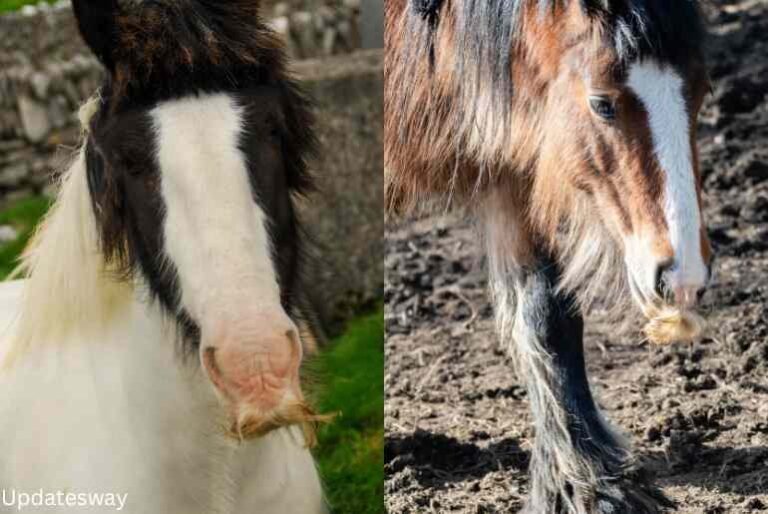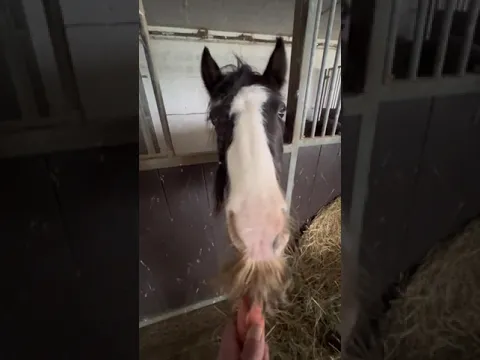Yes, there are horses with mustaches! While mustaches on horses are not particularly common, they occur naturally in some horse breeds. The most well-known horse breed with mustaches is the Andalusian, a Spanish horse breed known for its beautiful flowing manes and tails. Mustaches on horses are also seen in the Percheron and Clydesdale breeds.
Mustaches on horses are thought to be caused by a mutation in the KRT71 gene responsible for hair growth. This mutation results in excess hair growth in the mustache area, which can give the appearance of a mustache. While mustaches on horses are not harmful, they can be a bit of a nuisance, as the excess hair can get in the horse’s eyes and mouth. If you have a horse with a mustache, you may want to consider trimming the hair to keep your horse comfortable.
The history of horses with mustaches
The history of horses with mustaches is a long and complicated one. There are many theories about how they came to be, and no one knows where they originated.
Some believe that horses with mustaches are a natural occurrence and have always existed. Others believe they result from human intervention and were created through breeding or genetic engineering.
Whatever the case may be, horses with mustaches are a unique and interesting breed. They have been featured in artwork and literature for centuries and fascinate people worldwide.
There are many different theories about the origins of horses with mustaches. Some believe that they are a natural occurrence and have always existed. Others believe they result from human intervention and were created through breeding or genetic engineering.
Whatever the case may be, horses with mustaches are a unique and exciting breed. They have been featured in artwork and literature for centuries and fascinate people worldwide.
How do horses with mustaches compare to other horses?
Horses with mustaches are a unique breed! They have several distinct physical characteristics that set them apart from other horses. For one, they have a thick and luxurious hair coat covering their entire body. This coat is often a few shades darker than the horse’s natural color and can be either curly or straight. In addition, horses with mustaches often have a very prominent forelock, a tuft of hair hanging down over their forehead.
One of the most distinguishing features of horses with mustaches is their unique facial hair. As you might have guessed, these horses have mustaches! But, their mustaches are often much longer and more pronounced than other horses. Some horses with mustaches have mustaches that are several inches long! In addition to their mustaches, horses with mustaches often have very thick eyebrows.
So, how do horses with mustaches compare to other horses? Well, they are a unique breed! They have several distinct physical characteristics that set them apart from other horses. If you’re looking for a horse that is sure to turn heads, then a horse with a mustache is the way to go!
The benefits of having a horse with moustache
A mustache can be a very practical addition to a horse’s appearance. It can help protect the horse’s face from the sun and insects and can also help keep the horse’s nostrils clear of debris. Sometimes, a mustache can also help a horse breathe more easily.
The downside of having a horse with a mustache
A mustache on a horse may look cool, but it can be quite the downside. For one, it can be a pain to take care of. You must constantly brush it and ensure it doesn’t get too long. Otherwise, it will get in the way when the horse eats or drinks.
Another downside is that it can be dangerous for the horse. If the mustache gets too long, it can get caught on things and rip the horse’s mouth. This can lead to serious injuries.
So, while a mustache on a horse may look cool, it’s important to remember the potential downsides before you decide to grow one.
How to take care of a horse with a mustache
Do you have a horse with a mustache? If so, you’re probably wondering how to take care of it. Here are a few tips:
1. Use a soft brush to avoid irritating the skin.
2. Be extra careful when cleaning around the nostrils.
3. Use a mild shampoo to avoid stripping the natural oils from the hair.
4. Condition the mustache after every shampoo.
5. Trim the mustache regularly to keep it looking neat.
6. Protect the mustache from the sun with a hat or scarf.
These tips will help you keep your horse’s mustache looking its best.



0 Comments